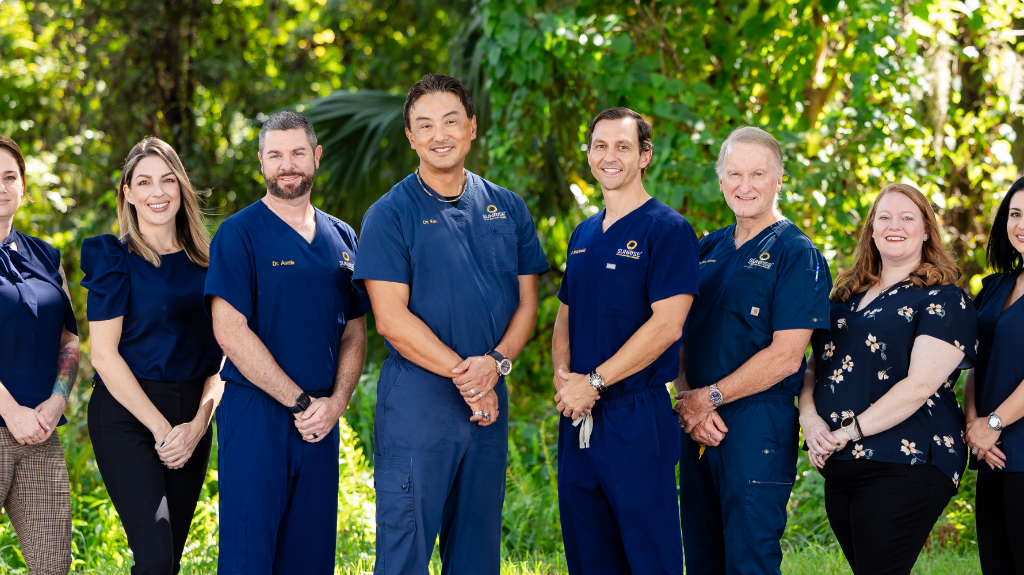This Article Has Been Medically Approved By


Missing molars, premolars and canine teeth not only interfere with your ability to eat and speak normally but also promotes loss of gum health and jawbone integrity. In addition, rapid deterioration of shrinking gums and bone contributes to facial hollowing, especially under your cheekbones. People without a complete set of back teeth often appear prematurely aged because of sunken cheeks. Even losing just one molar or premolar may be conducive to surrounding teeth becoming loose as gums and bone recede. Fortunately, a maxillofacial surgeon can provide dental implants to replace missing teeth, prevent further loss of teeth and eliminate sunken cheeks.
What are Dental Implants?
Anchored to the jawbone with a titanium screw and an abutment, a dental implant offers the natural appearance and stability of real tooth. Following fusion of the screw to the jawbone (osseointegration), your maxillofacial surgeon completes the dental implant procedure by attaching the abutment and crown to the screw appliance. In addition, titanium and other materials used to make dental implants are biologically compatible with the body, which nearly eliminates the risk of an allergic response to the implant. Unlike dentures, implants also contribute to supporting the density and volume of the jawbone because it stimulates bone health in the same way real teeth support good bone integrity.
Are Dental Implants Hard to Take Care Of?
Not any more difficult than taking care of your own natural teeth! During the first week following a dental implant procedure, your gums might be sore and you should eat only soft foods and liquids until inflammation recedes. Your surgeon can prescribe or recommend pain medication to relieve discomfort. Some people find cold (not freezing) foods soothe sore gums.
Tips for taking care of dental implants include:
- Brushing and flossing twice daily (use soft bristle toothbrushes)
- Rinsing with antibacterial, alcohol-free mouthwash
- Getting regular check-ups
Although dental implants are almost as strong as natural teeth, they can still become stained, crack or break like real teeth. Be aware that chewing on hard candy, ice, some nuts and pencils could result in damage to an implant. With proper care, dental implants can last decades, as long as you use common sense when eating hard foods or using your teeth to open packages.
What are Signs of Possible Problems with a Dental Implant?
Less than one percent of dental implant patients experience problems with their implants. However, just like other minimally invasive surgical procedures, dental implant surgery carries both short-term and long-term risks such as gum infection (short-term) or bone infection (long-term). Signs you need to visit your maxillofacial surgeon include loosening of the crown, inflammation weeks after the procedure was completed and unusual halitosis that does not go away with brushing and rinsing.
Will I Ever Need to Replace a Dental Implant?
As long as you practice good oral hygiene habits, avoid biting down on hard items and get check-ups every six months, your dental implants may last you a lifetime. Also, since implant crowns are made of porcelain, they could become stained like real teeth. Smoking and drinking coffee or tea may contribute to staining if you don’t brush your teeth twice a day and visit your dentist for professional cleanings.
Who are Good Candidates for Dental Implants?
Most healthy adults are good candidates for dental implant surgery. If you have at least one missing tooth and do not want to wear a bridge or partial denture, call Sunrise Facial & Oral Surgery today to schedule a consultation appointment with a maxillofacial surgeon. An evaluation consists of measuring jawbone density to ensure bone is sturdy enough to hold implants, checking for signs of gingivitis or other oral disease and asking about your medical history. When the jawbone is found to be too soft or not thick enough to hold an implant, your surgeon may suggest bone graft treatment for creating a solid base to insert a dental implant.
If you would like to learn more about dental implants or other cosmetic procedures such as facelifts, lip augmentation, Botox and many more, contact Sunrise Facial & Oral Surgery to make an appointment.



